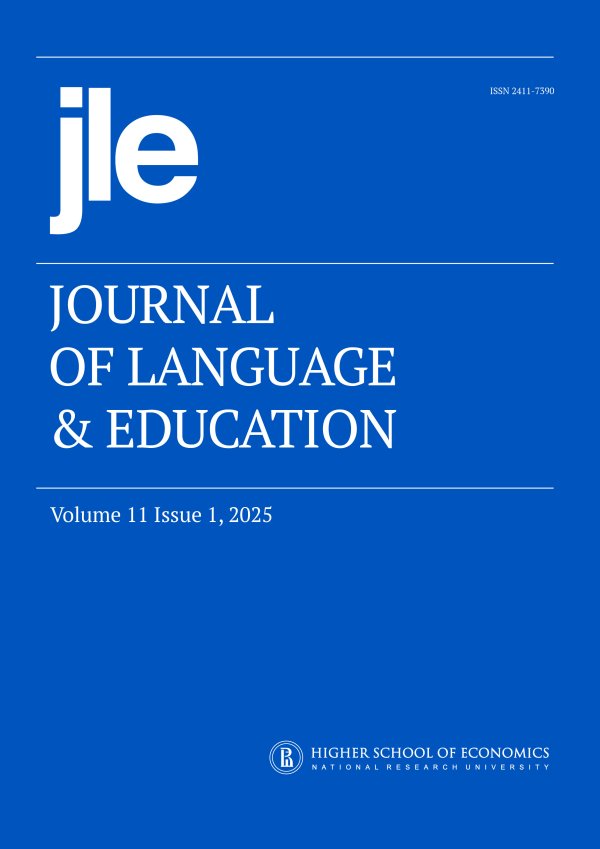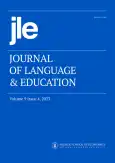Effects of Computer-assisted Language Learning (CALL) and Different Interaction Patterns on Vocabulary Development of EFL Learners
- Авторы: Shamshiri F.1, Shafiee S.2, Rahimi D.F2
-
Учреждения:
- Shahrekord University
- Shahrekord Branch, Islamic Azad University, Shahrekord, Iran
- Выпуск: Том 9, № 4 (2023)
- Страницы: 110-127
- Раздел: Оригинальное исследование
- URL: https://journal-vniispk.ru/2411-7390/article/view/302296
- DOI: https://doi.org/10.17323/jle.2023.12093
- ID: 302296
Цитировать
Полный текст
Аннотация
Background: Research on the integration of Computer-assisted language learning (CALL) in EFL contexts has witnessed a significant advance due to the modern changes in language education and technology over the last decades. However, the effects of CALL on vocabulary development through different interaction patterns have not been investigated by researchers.
Purpose: Attempts have been made to assess the effects of CALL and Memrise software on the vocabulary development of intermediate EFL learners through the three interaction patterns: 1) pair-work interaction, 2) small-group-work interaction, and 3) individual content.
Method: A total of 100 male and female Iranian EFL learners were selected through convenience sampling and assigned into three experimental and one control groups, each consisting of 25 learners. The Oxford Quick Placement Test was taken to assure the homogeneity of the participants. Then, a multiple-choice vocabulary test was taken as a pretest. The three experimental groups learned vocabulary through Memrise desktop software with three different interaction patterns, while the control group learned the same through the conventional pattern. A reshuffled version of the pretest constitutes the subsequent posttest.
Result: The results of the comparison between all pretests and posttests indicated that there was a significant difference between the vocabulary scores of the pretest and the posttest of the experimental groups, indicating the efficiency of these treatments. It was revealed that the pair work was slightly more effective than small-group work and that these two types of intervention were more effective than individual-content interaction, where the latter was more effective than conventional instruction.
Conclusion: According to the findings, students are advised to take advantage of CALL-based facilities and participate in interactive activities.
Об авторах
F. Shamshiri
Shahrekord University
Автор, ответственный за переписку.
Email: leilashamshiri@yahoo.com
S. Shafiee
Shahrekord Branch, Islamic Azad University, Shahrekord, Iran
Email: s.shafiee@iaushk.ac.ir
D. F Rahimi
Shahrekord Branch, Islamic Azad University, Shahrekord, Iran
Email: rahimi_fariba@yahoo.com
Список литературы
- Anitha, P., & Sundaram, S. (2021). Prevalence, types and reasons for academic dishonesty among college students. Journal of Studies in Social Sciences and Humanities, 7(1). 1-14.
- Bilić-Zulle, L., Frković, V., Turk, T., Ažman, J., & Petrovečki, M. (2005). Prevalence of plagiarism among medical students. Croatian Medical Journal, 46(1), 126-131.
- Brimble, M., & Stevenson-Clarke, P. (2005). Perceptions of the prevalence and seriousness of academic dishonesty in Australian universities. Australian Educational Researcher, 32(3), 19-44. DOI: https://doi.org/10.1007/BF03216825
- Cotton, D. R. E., Cotton, P. A., & Reuben Shipway, J. (2023). Chatting and cheating: Ensuring academic integrity in the era of ChatGPT. Innovations in Education and Teaching International. DOI: https://doi.org/10.1080/14703297.2023.2190148
- Crawford, J., Cowling, M., & Allen, K.-A. (2023). Leadership is needed for ethical ChatGPT: Character, assessment, and learning using artificial intelligence (AI). Journal of University Teaching and Learning Practice, 20(3). DOI: https://doi.org/10.53761/1.20.3.02
- Currie, G. M. (2023). Academic integrity and artificial intelligence: Is ChatGPT hype, hero or heresy? Seminars in Nuclear Medicine, 53(5), 719-730. DOI: https://doi.org/10.1053/j.semnuclmed.2023.04.008
- Davis, S. F., Grover, C. A., Becker, A. H., & McGregor, L. N. (1992). Academic dishonesty: Prevalence, determinants, techniques, and punishments. Teaching of Psychology, 19(1), 16-20. DOI: https://doi.org/10.1207/s15328023top1901_3
- Denisova-Schmidt, E. (Ed.). (2020). Corruption in higher education: Global challenges and responses. BRILL.
- Dukić, D. (2022). Plagiranje u digitalnome dobu: znanja i ponašanja studenata Sveučilišta J. J. Strossmayera u Osijeku. Vjesnik bibliotekara Hrvatske, 65(1), 251-272. DOI: https://doi.org/10.30754/vbh.65.1.927
- Eaton, S. E., & Christensen Huges, J. (Eds.). (2022). Academic integrity in Canada: An enduring and essential challenge. Springer International Publishing. DOI: https://doi.org/10.1007/978-3-030-83255-1
- Greitemeyer, T., & Kastenmüller, A. (2023). HEXACO, the Dark Triad, and Chat GPT: Who is willing to commit academic cheating? Heliyon, 9, 1-9. DOI: https://doi.org/10.1016/j.heliyon.2023.e19909
- Hill, G., Mason, J., & Dunn, A. (2021). Contract cheating: an increasing challenge for global academic community arising from COVID-19. Research and Practice in Technology Enhanced Learning, 16. DOI: https://doi.org/10.1186/s41039-021-00166-8
- Ives, B., Alama, M., Mosora, L. C., Mosora, M., Grosu-Radulescu, L., Clinciu, A. I., Cazan, A.-M., Badescu, G., Tufis, C., Diaconu, M., & Dutu, A. (2017). Patterns and predictors of academic dishonesty in Romanian university students. Higher Education, 74(5), 815-831. DOI: https://doi.org/10.1007/s10734-016-0079-8
- Jowarder, M. I. (2023). The influence of ChatGPT on social science students: Insights drawn from undergraduate students in the United States. Indonesian Journal of Innovation and Applied Sciences, 3(2), 194-200. DOI: https://doi.org/10.47540/ijias.v3i2.878
- Majstorović, D. (2016). Stavovi studenata korisnika Nacionalne i sveučilišne knjižnice u Zagrebu o plagiranju i javnoj objavi ocjenskih radova. Vjesnik bibliotekara Hrvatske, 59(3/4), 131-152. https://hrcak.srce.hr/187613.
- Malesky, A., Grist, C., Poovey, K., & Dennis, N. (2021). The Effects of peer influence, honor codes, and personality traits on cheating behavior in a University Setting. Ethics & Behavior, 22(1). DOI: https://doi.org/10.1080/10508422.2020.1869006
- Ngo, T. T. A. (2023). The perception by university students of the use of ChatGPT in education.International Journal of Emerging Technologies in Learning, 18(17), 4-19. DOI: https://doi.org/10.3991/ijet.v18i17.39019
- O'Rourke, J., Barnes, J., Deaton, A., Fulks, K., Ryan, K., & Rettinger, D. A. (2010). Imitation is the sincerest form of cheating: The influence of direct knowledge and attitudes on academic dishonesty. Ethics & Behavior, 20. 47-64. DOI: https://doi.org/10.1080/10508420903482616
- Petrak, O., & Bartolac, A. (2014). Academic honesty amongst students of health studies. Croatian Journal of Education, 16(1), 81-117. https://hrcak.srce.hr/120169.
- Pupovac, V., Bilic-Zulle, L., Mavrinac, M., & Petrovecki, M. (2010). Attitudes toward plagiarism among pharmacy and medical biochemistry students - cross-sectional survey study. Biochemia Medica, 20(2), 307-313.
- Rigby, D., Burton, M., Balcombe, K., Bateman, I., & Mulatu, A. (2015). Contract cheating & the market in essays. Journal of Economic Behavior & Organization, 111. 23-37. DOI: https://doi.org/10.1016/j.jebo.2014.12.019
- Singh, H., Tayarani-Najaran, M.-H., & Yaqoob, M. (2023). Exploring computer science students' perception of ChatGPT in higher education: A descriptive and correlation study. Education Science, 13(9), 1-23. DOI: https://doi.org/10.3390/educsci13090924
- Sweeney, S. (2023). Who wrote this? Essay mills and assessment - Considerations regarding contract cheating and AI in higher education.International Journal of Management Education, 21(2). DOI: https://doi.org/10.1016/j.ijme.2023.100818
- Štambuk, M., Maričić, A., & Hanzec, I. (2015). Cheating is unacceptable, but… Teachers' perceptions of and reactions to students' cheating at schools and universities. Croatian Journal of Education, 17(4), 259-288. https://hrcak.srce.hr/153248.
- Kukolja Taradi, S., Taradi, M., & Dogas, Z. (2012). Croatian medical students see academic dishonesty as an acceptable behaviour: a cross-sectional multicampus study. Journal of Medical Ethics, 38(6), 376-379. DOI: https://doi.org/10.1136/medethics-2011-100015
- Vaccino-Salvadore, S. (2023). Exploring the ethical dimensions of using ChatGPT in language learning and beyond. Languages, 8(3). DOI: https://doi.org/10.3390/languages8030191
- Walker, M., & Townley, C. (2012). Contract cheating: A new challenge for academic honesty? Journal of Academic Ethics, 10(1), 27-44. DOI: https://doi.org/10.1007/s10805-012-9150-y
- Yilmaz, R., Karaoglan Yilmaz, F. G. (2023). Augmented intelligence in programming learning: Examining student views on the use of ChatGPT for programming learning.Computers in Human Behavior: Artificial Humans, 1(2). DOI: https://doi.org/10.1016/j.chbah.2023.100005
Дополнительные файлы











